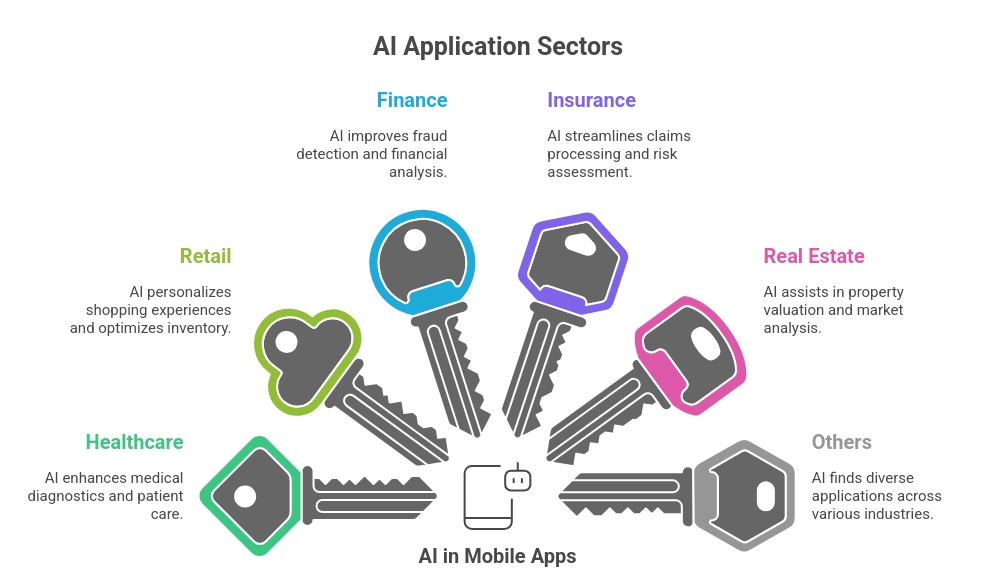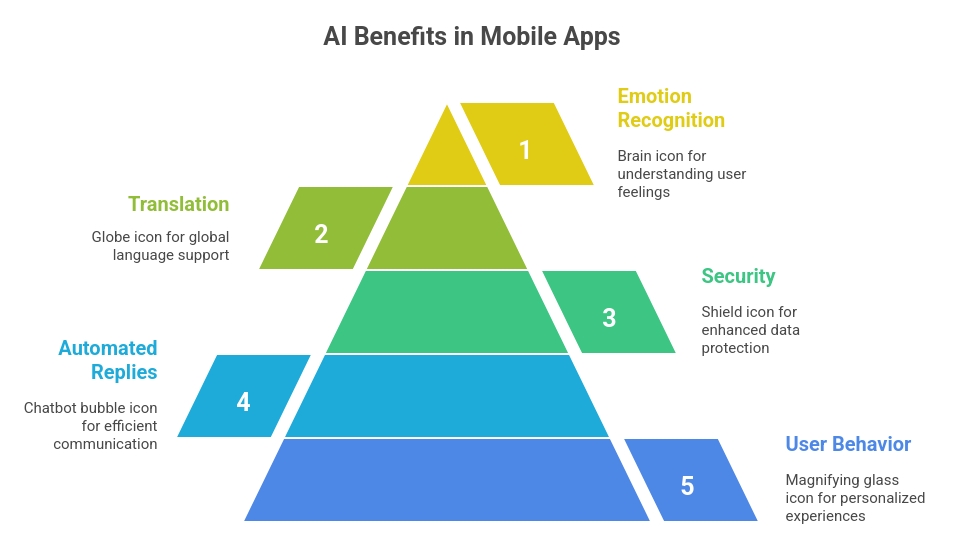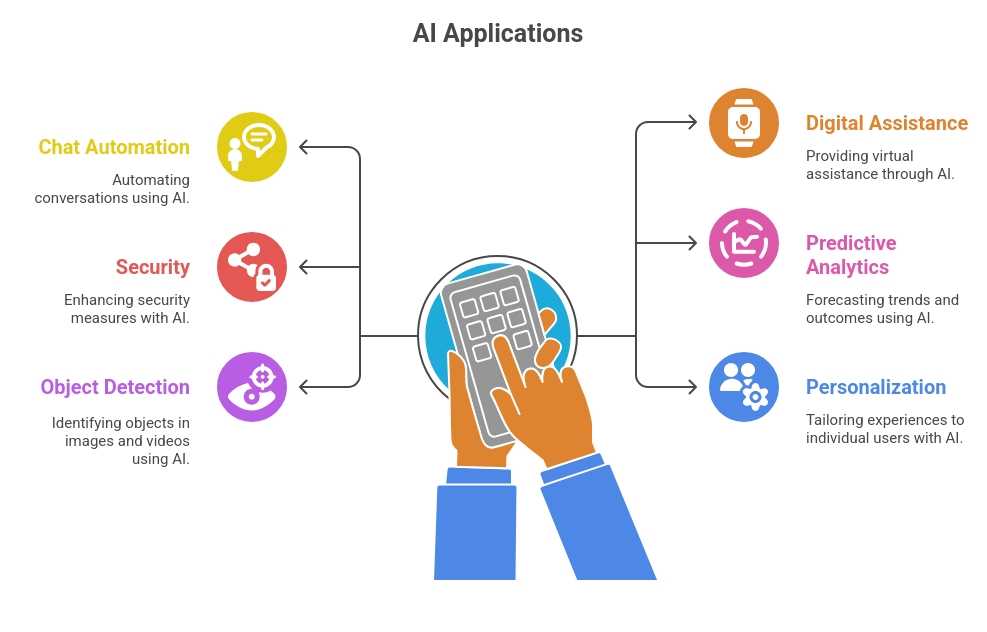Discover how artificial intelligence in mobile app development transforms user experience, boosts efficiency, and enhances security for businesses worldwide. Our AI Development Team is always here to support you.
Artificial Intelligence in Mobile App Development
Mobile apps are no longer just digital tools. They’ve become personal assistants, business partners, and sometimes even decision-makers. Behind this transformation lies one powerful driver: artificial intelligence.
The role of artificial intelligence in mobile app development is not about fancy jargon or futuristic ideas, it’s about solving real problems. From personalizing shopping experiences to detecting fraud in finance apps, businesses are using this technology to make apps smarter, faster, and more useful.
In this guide, we’ll explore how companies can harness artificial intelligence in mobile app development, the benefits it brings, and the right way to integrate it.
An Overview
- Why Artificial Intelligence Matters in Mobile Apps
- The Role of Artificial Intelligence in Mobile App Development
- The Potential of Artificial Intelligence in Mobile App Development
- Key Benefits of Using Artificial Intelligence in Mobile App Development
- 6 Practical Uses of Artificial Intelligence in Mobile Apps
- How to Bring Artificial Intelligence into Mobile Apps
- The Business Case for Artificial Intelligence in Mobile App Development
Why Artificial Intelligence Matters in Mobile Apps
People use mobile apps to order food, manage health, book travel, and handle banking. Every action generates data. But data alone doesn’t add value unless it’s turned into insight. This is where artificial intelligence becomes essential.
Artificial intelligence studies user behavior, predicts what they want, and improves how apps respond. For businesses, this means higher engagement, reduced errors, and loyal customers who return again and again.
The Role of Artificial Intelligence in Mobile App Development
Artificial intelligence powers many of the features users now expect in apps. Instead of offering static functions, apps can adapt and respond in real time. Below are the key areas where it brings value.
- Search Optimization – Smarter apps don’t just find results; they predict what users want before typing a word.
- Automation – Routine tasks such as scheduling, notifications, and replies can run without manual effort.
- Logical Reasoning – AI-driven apps can recommend the best decisions based on available data.
- Smart Replies – Suggested responses speed up communication and make apps more user-friendly.
- IoT Integration – Combining AI with connected devices creates more interactive experiences.
- Personalization – From product suggestions to content feeds, apps adapt to individual preferences.
- Real-Time Translation – Breaking language barriers instantly for global reach.
- Chatbots – Providing instant support without waiting for human agents.
- Security Enhancements – Using facial recognition and anomaly detection to safeguard data.
The Potential of Artificial Intelligence in Mobile App Development
Artificial intelligence isn’t a single technology. It’s a combination of methods like machine learning, natural language processing, computer vision, and predictive analytics. Together, these fields give mobile apps a competitive advantage.
Industries already benefiting include:
- Healthcare – Faster diagnosis, medication reminders, patient monitoring.
- Retail – Personalized shopping, inventory optimization, fraud prevention.
- Finance – Credit risk analysis, fraud detection, smart investment advice.
- Insurance – Faster claims processing, predictive risk models.
- Real Estate – Property recommendations, automated documentation.
Mobile apps sit at the heart of this transformation. They are rich in data, highly personal, and constantly used, making them perfect for embedding artificial intelligence.

Key Benefits of Using Artificial Intelligence in Mobile App Development
Here are the top benefits companies gain by embedding artificial intelligence into apps:
- Study User Behavior – Machine learning uncovers user habits and preferences, enabling highly relevant recommendations.
- Automated Replies – Smart response suggestions make communication faster and more intuitive.
- Handle Repetitive Tasks – Cuts down on time-consuming work, letting employees focus on innovation.
- Real-Time Translation – Breaks language barriers and supports global communication.
- Stronger Security – Safeguards sensitive data with biometric authentication and fraud detection.
- Emotion Recognition – Systems detect human emotions to enhance user interactions.

6 Practical Uses of Artificial Intelligence in Mobile Apps
Businesses often ask: How exactly can artificial intelligence improve my app? Below are six real-world uses that make an impact.
- Chat Automation
AI-powered chatbots handle customer queries instantly. They reduce costs, provide 24/7 support, and ensure consistent service. According to Gartner, conversational bots could save businesses billions annually by reducing reliance on large call centers.
- Digital Assistance
Virtual assistants allow users to interact through voice commands. This is vital not only for convenience but also for accessibility. From scheduling meetings to guiding a driver with hands-free instructions, this feature improves usability.
- Security
Apps that deal with payments or personal data must prioritize security. AI strengthens defenses by detecting suspicious activity, blocking threats, and enhancing biometric authentication. Over time, the system only gets sharper.
- Predictive Analytics
AI doesn’t just analyze past data; it predicts future patterns. For example, retailers can forecast demand for specific products, while healthcare apps can anticipate patient risks. Businesses gain foresight and agility.
- Object Detection
Image recognition combined with AI enables apps to identify people, places, or objects. Healthcare apps use this for diagnosis, while insurance apps use it for damage assessment.
- Personalization
With artificial intelligence in mobile app development, personalization reaches a new level. From product recommendations in e-commerce apps to custom workout routines in fitness apps, users feel that the app “understands” them.

How to Bring Artificial Intelligence into Mobile Apps
Integrating artificial intelligence into an app requires a structured approach. Here’s how businesses can get it right:
- Identify the Right Business Challenge
Start by asking: What problem will AI solve? Targeting clear goals prevents wasted resources and avoids feature overload.
- Analyze Your Data Sources
Data is the foundation. Identify where it will come from, user behavior, sensors, third-party systems, and prepare it for training AI models.
- Define Clear Metrics
Set measurable outcomes such as reduced response time, improved engagement, or higher conversions. Metrics will help track progress and justify investment.
- Build and Integrate the Solution
Work with developers skilled in both mobile apps and AI frameworks. Decide between native apps for iOS/Android or cross-platform solutions depending on your audience.
- Connect with External Tools
Many AI features require integration with APIs or external platforms. For complex apps, custom integrations may be necessary.
- Track and Improve
Artificial intelligence improves over time with more data. Regular monitoring ensures the system adapts, eliminates errors, and aligns with business goals.

The Business Case for Artificial Intelligence in Mobile App Development
Investing in AI-powered apps isn’t just about keeping up with competitors, it’s about staying relevant. Users expect smart recommendations, instant support, and strong security as standard. Businesses that fail to adapt risk losing customers to apps that feel more intuitive.
On the other hand, those who embrace artificial intelligence gain:
- Reduced operational costs
- Higher engagement rates
- Better customer loyalty
- Stronger brand positioning
This makes artificial intelligence in mobile app development not a trend, but a long-term strategy.
[If needed, Our team is available 24/7 for additional assistance.]
Conclusion
The influence of artificial intelligence in mobile app development is undeniable. It is transforming the way apps interact with users, handle data, and deliver value. For businesses, the opportunity is too significant to ignore.
From predictive analytics and personalization to security and automation, the technology is reshaping industries. Companies that take the leap now will not only improve efficiency but also stand out in competitive markets.
Mobile apps are everywhere; and artificial intelligence is the force making them smarter. The question isn’t if you should adopt it, but how quickly you can.







0 Comments